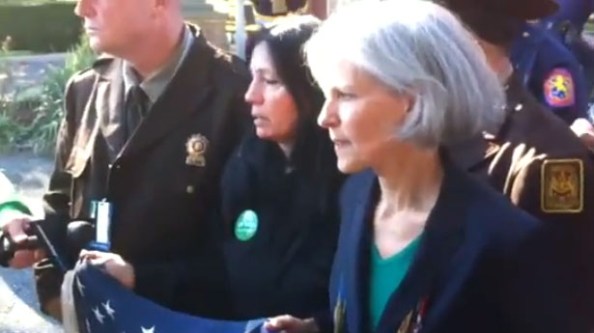Jill Stein and Cheri Honkala, the Green Party’s candidate for President and Vice President, you may have heard, were arrested a little over a week ago as they attempted to confront representatives of the Commission on Presidential Debates on the campus of Hofstra University in Hempstead, New York, on the eve of the second official Presidential debate between Democrat Barack Obama and Republican Mitt Romney. What you may not have heard about are the actual circumstances of the arrest.
In a suit for injunctive relief filed on October 22 in Circuit Court in Palm Beach, Florida, to prevent that night’s third official debate from occurring at Lynn University in Boca Raton without inclusion of third parties, Stein’s attorney related the salient details of that arrest:
24. On October 16th, 2012, less than one week ago, the United States Presidential Green Party candidate, Dr. Jill Stein, and her Vice-Presidential running mate, Ms. Cheri Honkala, were arrested for being on the grounds of the site of the Presidential debate which was scheduled to take place approximately seven hours later.
25. Dr. Stein arrived on the grounds of Hofstra University at approximately 2:00pm in order to speak with defendant Commission for Presidential Debates to request that she and other “third party” candidates be allowed to participate in that evening’s Presidential debate. Fifteen minutes after making that request to a representative of defendant Commission, Dr. Stein and Ms. Honkala were approached by local police and the Secret Service, at which time they were handcuffed, taken to a remote detention facility/wharehouse/ especially set up to house “protestors”, where they were forced to remain for over eight hours while tightly handcuffed to metal chairs until such time as the debate between the only two candidates “invited” to participate in the debate was over.
26. When Dr. Stein and Ms. Honkala were finally “un-hancuffed” from the metal chairs and released, they were sent out into the cold night in a remote location with no notice to their lawyers or staff of their release.
27. Dr. Stein’s comments concerning her arrest, handcuffing, and incarceration are, in essence, the basis for this injunction. Upon her release, Dr. Stein stated: “It was painful but symbolic to be handcuffed for all those hours, because that’s what the Commission on Presidential Debates has essentially done to American democracy.”
We know the suit failed in its primary purpose to stop the debate. But I hope you will take a minute and think about what happened to Stein and Honkala on the afternoon and evening of October 16. Think about these two women, candidates for president and vice-president, on the ballot in 38 states with their Republican and Democratic opponents, handcuffed with plastic restraints to metal chairs for eight hours in an “undisclosed location,” like common criminals or terrorists.
This is what American democracy in 2012 looks like.
